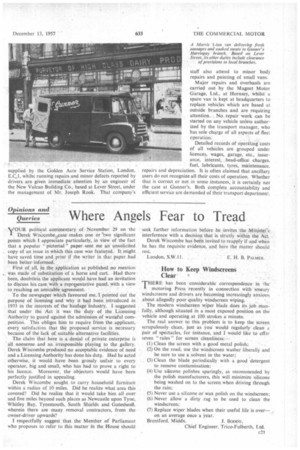Where Angels Fear to Tread
Page 63

If you've noticed an error in this article please click here to report it so we can fix it.
VOUR political commentary of November 29 on the 1 Derek Wiscombe ,case makes pne or `two significant points which I appreciate particularly, in view of the fact that a popular "pictorial" papersent me an unsolicited copy of an issue in which this case was featured.. It might have saved time and print if the writer in that paper had been bei ter. informed.
First of, all, in the application as published -no mention was made of substitution of a horse and cart.. Had there been, doubtless the applicant would have had an invitation to discuss his case with a repreontative panel, With a view to reaching an amicable agreement. • To the newspaper which favoured me, I pointed out the purpose of licensing and why it had been introduced in 1933 in the interests of the haulage industry. Isuggested that under the Act it was the duty of the Licensing Authority 'to guard against the admission of wasteful competition. This obliges him to require from the applicant, every satisfaction that the proposed service is necessary because of the lack 'of suitable alternative facilities.
The claim that here is a -denial of private enterprise is all nonsense and an irresponsible playing to the gallery. Derek Wiscombe produced no acceptable evidence of need and a Licensing Authority has done his duty. Had he acted otherwise, it would have been grossly unfair to every operator, big and small, who has had to prove a right to his licence. Moreover, the objectors would have been perfectly justified in appealing.
Derek Wiscombe sought to carry household furniture within a radius of 10 miles. Did he realize what area this covered? Did he realize that it would take him all over and five miles beyond such places as Newcastle upon Tyne, Whitley Bay, Tynemouth, South Shields and Gateshead, wherein there are many removal contractors, from the owner-driver upwards?
respectfully suggest that the Member of Parliament who proposes to refer to this matter in the House should
seek further information before he -invites 'the Minister's interference with a decision that is striatly. within the Act.
Derek Wiscombe has been invited to reapply if and when he has the requisite evidence, and here the matter should rest.
London, S.W.11. E. H. B. PALMER.
How to Keep Windscreens clear'
THERE has been considerable correspondence in the motoring Press recently in connection with smeary windscreens and drivers are becoming increasingly anxious about allegedly poor quality windscreen wiping.
The modern windscreen wiper blade does its job manfully, although situated in a most exposed position on the vehicle and operating at log strokes a' minute.
The real, answer to this problem' is to keep the screen scrupulously clean, just is you would regularly. clean a pair of spectacles, for instance, and I would like to offer seven " rules " for screen cleanliness:-
(1) Clean the screen with a good metal polish; (2)On the road, use the windscreen washer liberally and be sure to use a solvent in .the water; (3) Clean the blade periodically with a good detergent to remove contamination; (4) Use silicone polishes sparingly, as recommended by the polish manufacturers, this will minimize silicone being washed on to the screen.when driving through the rain; (5) Never use a silicone or wax polish on the windscreen; (6) Never allow a dirty rag to be used to clean the . windscreen; (7) Replace wiper blades when their useful life is over— on an average once a Year.
Brentford, Middx. J. BODDY,
Chief Engineer, Trico-Folberth, Ltd.




















































































































